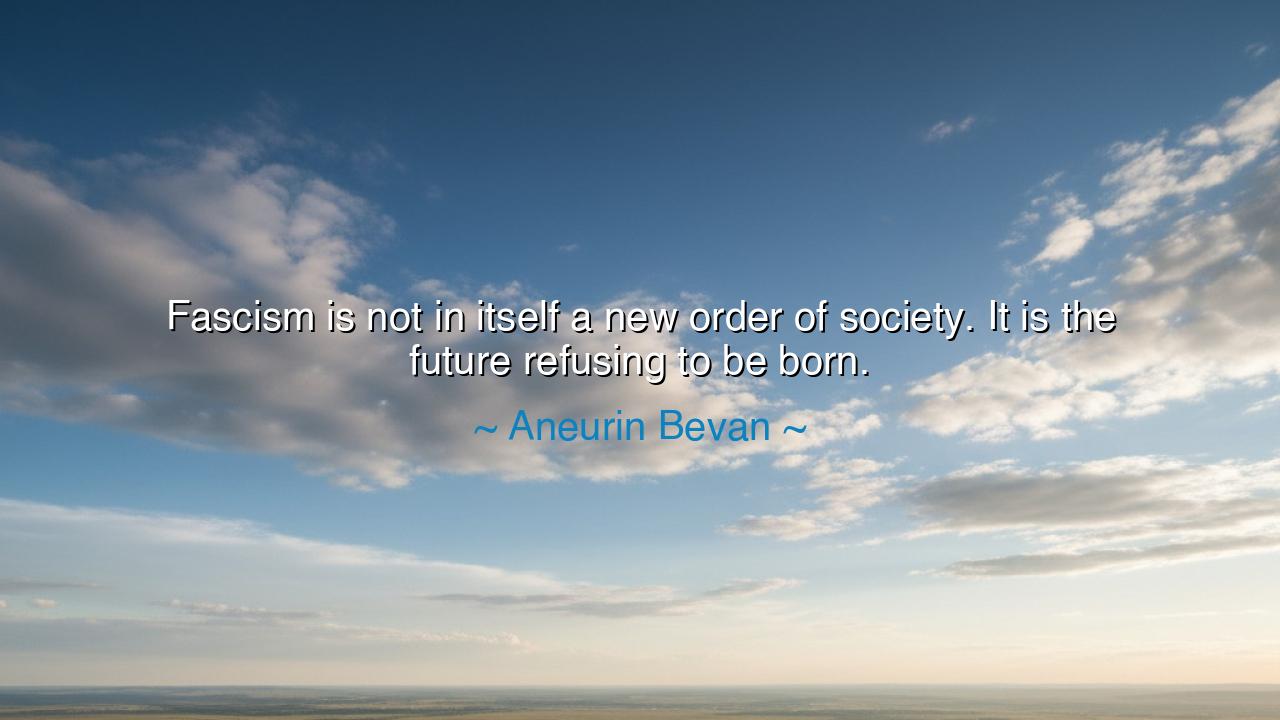
Fascism is not in itself a new order of society. It is the future






“Fascism is not in itself a new order of society. It is the future refusing to be born.”
— Aneurin Bevan
In these thunderous words, Aneurin Bevan, the fiery British statesman and founder of the National Health Service, speaks as both prophet and guardian of the human spirit. His statement is not merely political—it is a cry from the soul of civilization itself. For Bevan understood that fascism is not progress, not evolution, not even true revolution. It is the death of possibility, the clutching hand of fear strangling the throat of the future. When he declares that fascism is “the future refusing to be born,” he reveals its essence: the rejection of growth, the denial of freedom, and the terror of change.
To the unwise, fascism may appear as a new order—a force of unity, power, or discipline. But Bevan tears away this illusion. He saw firsthand how fascism rose from the ashes of despair in the early twentieth century, when nations wounded by war turned their eyes backward instead of forward. He saw how men like Mussolini and Hitler cloaked nostalgia in banners and blood, promising renewal but delivering only regression—a return to brutality, obedience, and myth. Fascism, Bevan warns, is not a beginning but an ending: the barricading of the human spirit against its own evolution. It is the moment when fear of the unknown outweighs the courage to create.
The origin of Bevan’s insight lies in the age he lived through—the era between two world wars, when democracy trembled and the old world cracked under the weight of its contradictions. Many longed for the comfort of control, for simple answers to complex suffering. Fascism offered that false comfort, demanding submission instead of understanding, worship of the past instead of invention for the future. Bevan, a son of the Welsh coal mines who rose to the heights of power, knew that progress is born of struggle and imagination, not conformity. He saw that whenever humanity grows weary of freedom’s responsibilities, there comes a temptation to trade liberty for order—and that temptation is the womb in which fascism forms.
Consider the story of Germany in the 1930s. A nation bruised by war, humiliated by economic ruin, and haunted by uncertainty turned to a man who promised greatness reborn. Yet what followed was not rebirth, but regression—an empire built upon ashes and hatred, upon books burned and minds silenced. The artists, the thinkers, the dreamers—the carriers of the future—were driven into exile or death. Bevan’s words echo across that tragedy: the future did not fail to exist—it was refused, strangled before it could speak. For fascism fears imagination, because imagination is freedom; it fears progress, because progress dethrones the tyrant.
Bevan’s statement, however, is not only a condemnation—it is a call to courage. If fascism is the future refusing to be born, then our sacred duty is to be midwives of that birth. It is to protect the fragile flame of new ideas, to defend the artist’s vision, the scientist’s experiment, the citizen’s right to question. Every age faces this battle anew, for the temptation of fascism is eternal—it lies wherever people are told that obedience is safer than thought, that the past was purer than the present, that strength is holier than mercy. To resist such darkness is not the work of soldiers alone, but of all who dare to think freely.
Let it be known, then, that the future is not born through comfort, but through conflict with fear. Each generation must choose whether to build or to bow, whether to nurture the child of progress or to suffocate it beneath nostalgia’s shroud. Bevan’s words remind us that every silence in the face of tyranny delays that birth; every act of courage, however small, brings it closer. The future does not come of its own accord—it must be protected, fought for, and delivered through conscience and action.
So, my listener, take this teaching into your heart: when the world grows weary, when voices preach submission disguised as peace, remember Bevan’s truth. Fascism is not strength—it is fear wearing armor. Do not let fear rule your mind or your nation. Defend curiosity, nurture compassion, and guard the fragile seed of progress that grows in every human heart. For as long as there are those who dream and those who dare, the future will not be refused—it will be born again, radiant and unyielding, beneath the light of courage.






AAdministratorAdministrator
Welcome, honored guests. Please leave a comment, we will respond soon